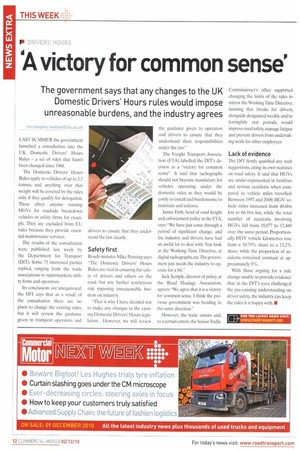dA victory for common sense'
Page 12

If you've noticed an error in this article please click here to report it so we can fix it.
The government says that any changes to the UK Domestic Drivers' Hours rules would impose unreasonable burdens, and the industry agrees
christopher.wattonfarbi.co.uk LAST SUMMER the government launched a consultation into the UK Domestic Drivers' Hours Rules — a set of rules that hasn't been changed since 1968.
The Domestic Drivers' Hours Rules apply to vehicles of up to 3.5 tonnes, and anything over that weight will be covered by the rules only if they qualify for derogation. These affect anyone running HGVs for roadside breakdown vehicles or utility firms, for example. They are excluded from EU rules because they provide essential maintenance services The results of the consultation were published last week by the Department for Transport (D1T). Some 73 interested parties replied, ranging from the trade associations to supermarkets. utility firms and operators.
Its conclusions are unequivocal: the DtT says that as a result of the consultation there are no plans to change the existing rules, but it will review the guidance given to transport operators and Safety first Roads minister Mike Penning says: 'The Domestic Drivers' Hours Rules are vital in ensuring the safety of drivers and others on the road, but any further restrictions risk imposing unreasonable burdens on industry.
"That is why I have decided not to make any changes to the existing Domestic Drivers' Hours legislation. However, we will review the guidance given to operators and drivers to ensure that they understand their responsibilities under the law."
The Freight Transport Association (ETA) labelled the DtT's decision as a "victory for common sense". It said that tachographs should not become mandatory for vehicles operating under the domestic rules, as they would be costly to install and burdensome to maintain and enforce.
James Firth, head of road freight and enforcement policy at the ETA, says: "We have just come through a period of significant change. and the industry, and drivers, have had an awful lot to deal with. You look at the Working Time Directive, at digital tachographs, etc.The government just needs the industry to operate for a bit."
Jack Semple, director of policy at the Road Haulage Association, agrees: "We agree that it is a victory for common sense. I think the previous government was heading in the same direction."
However, the trade unions and, to a certain extent, the Senior Traffic Commissioner's office supported changing the limits of the rules to mirror the Working Time Directive; insisting that breaks for drivers, alongside designated weekly and/or fortnightly rest periods, would improve road safety, manage fatigue and prevent drivers from undertaking work for other employees.
Lack of evidence The DII firmly quashed any such suggestions, citing its own statistics on road safety. It said that HGVs are under-represented in fatalities and serious accidents when compared to vehicle miles travelled. Between 1997 and 2009, HGV vehicle miles increased from 48.6bn km to 66.1bn km. while the total number of accidents involving HGVs fell from 19,077 to 12,449 over the same period. Proportionally, HGV vehicle kilometres rose from a 10.79% share to a 13.2% share, while the proportion of accidents remained constant at approximately 8%.
With those arguing for a rule change unable to provide evidence that. in the DfT's eyes, challenged the pre-existing understanding on driver safety, the industry can keep the rules it is happy with. •
































































































































